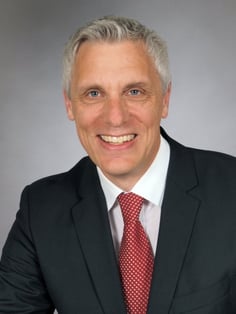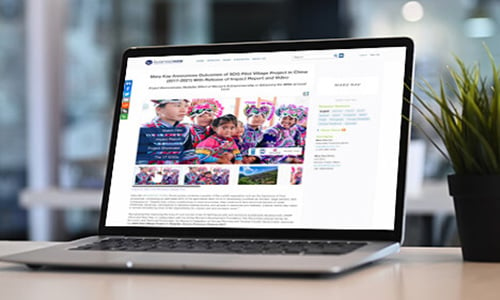Jan Wagner is a freelance financial journalist from Chicago who is based in Frankfurt, Germany.

He studied history at the University of Illinois in Chicago and was one of the first to win a Fulbright Scholarship for young journalists. He also has a master’s degree in journalism from Northwestern University and has been working as a journalist since 1994.
The main topics that he likes to cover as an investigative journalist are banking and asset management but also politics and economics.
His international background and years of experience have given him a broad perspective on the media landscape and the PR industry.
The Bankmagazin, procontra and Institutional Asset Manager are some of the publications that carry his articles.
I recently interviewed Jan Wagner to gain insight into the media landscape in Germany and the United States and to better understand the opportunities, differences and trends arising over the last few years in journalism.
During Mr. Wagner’s 26 years in journalism, he has witnessed many changes in the industry and describes himself as a “survivor.” For him, his job plays a very important role in the community.
Andrea Ballesteros: Jan, what is the most rewarding part of your career?
Jan Wagner: The most rewarding part of my career is being able to research and craft a good story. I am a very inquisitive person, somebody who always asks questions to get to the bottom of a story.
AB: How do you start your day?
JW: I begin my day by checking the news online while drinking a good cup of coffee. The one source that I cannot miss is the Frankfurter Allgemeine Zeitung. The FAZ is the paper of record in Germany.
AB: What kind of skills does one need in order to become a journalist, particularly when dealing with complicated topics like finance and banking?
JW: Knowing how to deal with people while withstanding pressure and criticism are among the most important skills to develop in becoming a journalist. Finance and banking can be very technical, so one has to maintain a humble approach to learning about them.
AB: With the amount of information that is readily at our hands today, it seems it has gotten harder for some to discern between facts and "fake" news. How would you solve the issue of fake news? Where would be the best place to start?
JW: I believe education is the best way to confront this problem. It is important to learn how to think independently and rationally. Educated people are more than capable of distinguishing between real and fake news.
AB: What news do you read on a regular basis? What are your sources?
JW: Some of the other trustworthy sources that I consult are the Boersen-Zeitung, Handelsblatt, Financial Times, The Economist and CNBC. The FAZ is my go-to paper to inform myself about what is happening in Germany.
AB: As a journalist, what would you say you generally look for or expect from a press release? What are the top three things you identify in a release to determine its newsworthiness and appeal to readers?
JW: If you want to reach a journalist, I recommend thinking like a journalist. Content is king and PR professionals also should package their content in a straightforward way. My suggestion would be to communicate the message in plain speech. Cut out the marketing guff.
AB: We have talked about many things that PR people or journalists need to be doing in order to be successful, but what about the “NO GO's?” What is the one thing PR professionals need to stop doing?
JW: I would prefer that PR professionals use their phones more frequently. For me, my profession is all about human contact, and the phone definitely does a better job at connecting people than e-mail. E-mail is secondary communication, to be used more for documenting rather than person-to-person communication. So please: if you receive a call from a journalist, call him or her back. Don’t just take care of it with an email. Getting to know a journalist better over lunch or coffee is always advisable.
AB: I understand you have a very international background. Where are you from and in which countries have you lived and worked in?
JW: I was born in Chicago, USA. I worked there in the early stages of my career before winning the Fulbright and coming to Germany in 1996. As the son of German and Danish immigrants to the U.S., I do in fact have a very international background.
AB: When living and working in two such different countries like the U.S. and Germany, do you see any outstanding differences in doing business with journalists/media professionals?
JW: The differences I see have mostly to do with asking hard questions and following up. My own view is that German journalists are a bit more reserved on this issue, whereas American journalists are more comfortable with it. But everyone has strengths and weakness, and one of the things I admire about Germans is how well they listen and how much they emphasize being polite and respectful to each other.
AB: One of the most trending topics we have encountered within the last few years is automated journalism. What is your take on this topic?
JW: I have very strong feelings about this. The short answer is that I am completely against it. In my craft, one person informs and hopefully enlightens others. Automated journalism doesn’t have anything to do with this! A machine could never replace what a journalist does – whether judging what’s newsworthy, doing research or writing in a way that makes readers think about the issues. For me, automated journalism is not the correct term. It should be defined as collecting data.
AB: So, if you could see into the future, to wrap this up, what is the future of journalism? Are you hopeful? Are you concerned?
JW: It’s hard for me to be optimistic. Over the years I have seen the decline of my industry, most notably because we have lost our role as the gatekeepers of information in this digital age. The internet provides too many distractions like social media and engenders a type of reading that is more superficial. I’m just as over-digitalized as anyone else, but I still really try to read a lot and every day.
The internet has also more or less destroyed the traditional business model. Yes, major publications are hanging on with digital subscriptions and advertising that costs a fraction of what it did in printed form. My heart goes out to these publications, but I wonder how long they will continue to finance quality journalism. Investigative journalism, the real added value of my profession, is very expensive and hence not being funded as much as it used to be.
That said, I think our industry would be better served if society emphasized deep reading more. That way, people would become hungry that get to the heart of the matter and make them think. They would then be more than willing to pay for such content. In this digital age, the only real profiteers have been Google, Facebook and smart phone manufacturers, while publishing companies have lost out. Just by reading more, the public can address this huge imbalance.
Get the latest PR, IR, Marketing and Media tips on the Business Wire Blog. Subscribe today!





